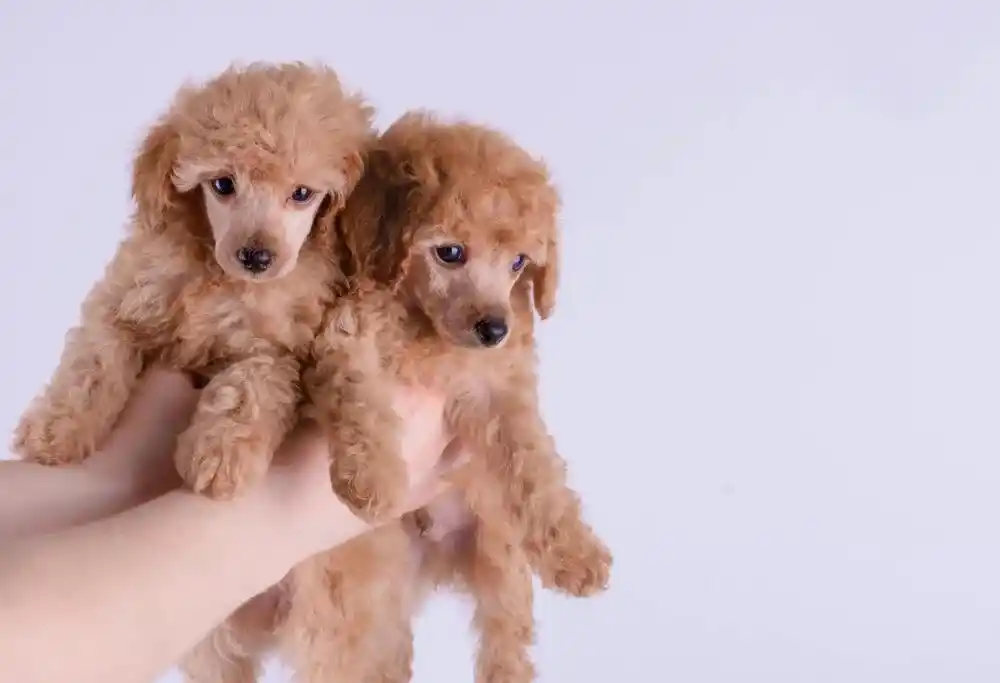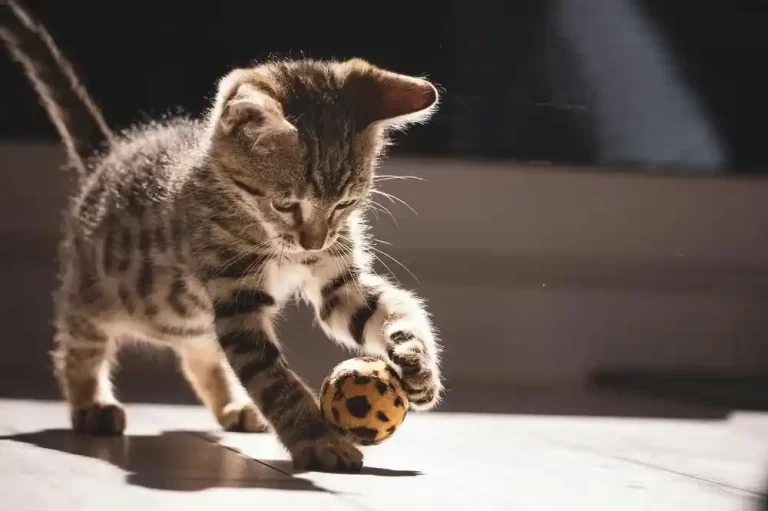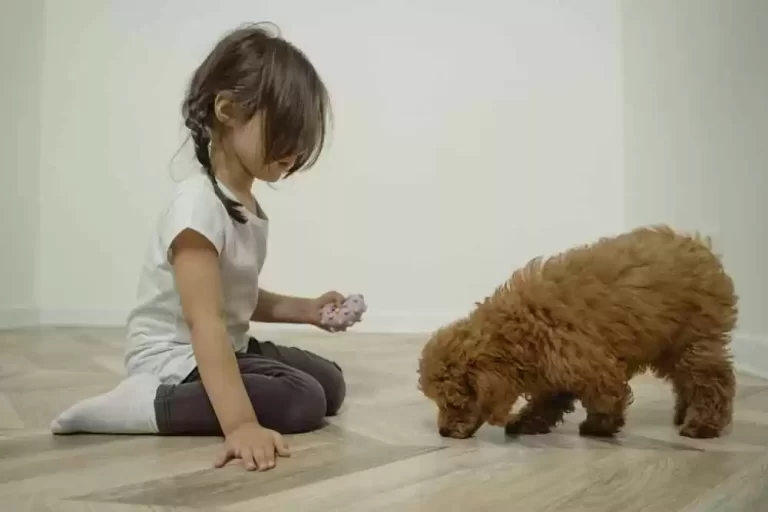If you’re considering adding a new furry friend to your family, the Toy Poodle is an excellent choice. This breed combines intelligence, charm, and hypoallergenic qualities, making it a favorite among many dog lovers across the United States. In this comprehensive guide, we’ll explore everything you need to know about Toy Poodles — from their personality and care to health, grooming, and training tips.
What Makes the Toy Poodle Special?
First, the Toy Poodle stands out because of its unique combination of qualities. They are not just small and cute; they’re incredibly smart and highly trainable. Unlike many small dogs, Toy Poodles thrive on mental stimulation and companionship. This means they love to be involved in family activities and excel at learning new tricks or commands.
Besides their brains, their coat is another remarkable feature. Toy Poodles have a low-shedding, curly or wavy coat that comes in many colors, including black, white, apricot, and silver. This trait makes them a great option for allergy sufferers or families who want to keep pet hair under control.
Moreover, these dogs are very adaptable. Whether you live in an apartment in the city or a house with a backyard, Toy Poodles can adjust to various environments as long as they receive enough attention and exercise.
Toy Poodle Personality and Temperament
The personality of the Toy Poodle is one of the most appealing aspects of the breed. These dogs are playful, lively, and full of energy. They genuinely enjoy spending time with their humans and rarely shy away from meeting new friends — whether other dogs or people.
Because of their intelligence, Toy Poodles often require a lot of mental stimulation. They can become bored quickly if left alone for long periods, leading to mischievous behaviors like chewing or excessive barking. Families who choose a Toy Poodle should be ready to invest time in training, play, and interactive games.
This breed is also very affectionate and gentle, which makes Toy Poodles excellent companions for children. They usually get along well with kids and love being part of family activities. However, their small size means supervision around very young children is necessary to avoid accidental injury.

Toy Poodle Size and Lifespan
Toy Poodles remain small throughout their lives, typically weighing between 4 and 7 pounds (about 1.8 to 3 kg) and standing no taller than 10 inches (25 cm) at the shoulder. They usually stop growing by 7 months but may take longer to reach full maturity.
Their lifespan ranges from 12 to 15 years, but many live well into their late teens with proper care. This longevity means you can enjoy many years of companionship and joy with your Toy Poodle.
Keeping your Toy Poodle healthy involves more than regular vet visits. A balanced diet, regular exercise, and proper grooming all play a critical role in ensuring they live a long, happy life.
Toy Poodle Health: What You Need to Know
While Toy Poodles generally enjoy good health, they can be prone to specific conditions that responsible owners should watch for. Common issues include joint problems like patellar luxation and hip dysplasia, skin allergies, and heart conditions such as Mitral Valve Disease.
To help prevent or manage these health concerns, feeding your Toy Poodle a diet rich in anti-inflammatory and nutrient-dense ingredients is crucial. Foods like sardines (high in Omega-3), quinoa (for bone health), and antioxidants found in fennel seeds can support joint strength and mobility.
Skin allergies are another concern. Toy Poodles may react to food or environmental allergens, including pollen and grass. Regular grooming, elimination diets, and ingredients like hemp seeds, safflower oil, and fish oil can promote healthy skin and reduce irritation.
Heart health is vital too. Feeding a low-sodium diet with heart-supporting ingredients such as mushrooms, broccoli, and chia seeds can help maintain cardiovascular wellness.
Regular veterinary check-ups remain essential. Early detection and proactive care improve quality of life and longevity.
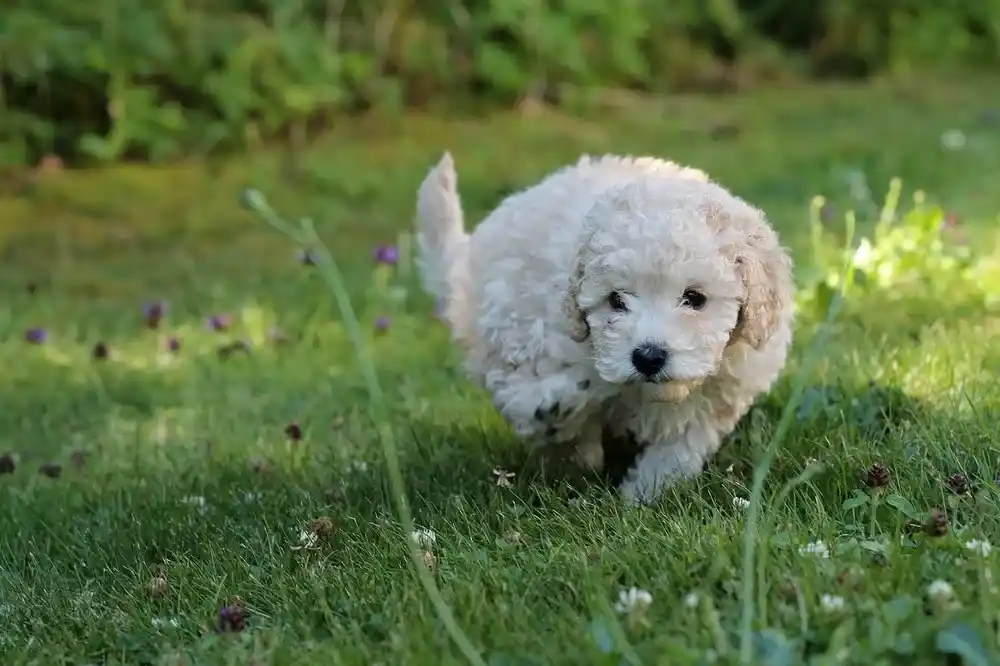
Feeding Your Toy Poodle Right
A well-balanced diet fuels your Toy Poodle’s active lifestyle and sharp mind. Choose meals with real food ingredients, including high-quality protein, healthy fats, and fresh vegetables. Avoid fillers or artificial additives.
Contrary to common myths, Toy Poodle puppies don’t require special puppy food if they receive the right portions of nutrient-rich meals. Their diet should support tissue growth, brain development, and energy needs through proteins, vitamins, minerals, and low-glycemic carbohydrates.
Remember, overfeeding can cause weight gain, putting extra strain on growing joints. Monitor portions carefully and supplement their meals with dog-safe leftovers like lean meats and veggies, avoiding fatty or toxic foods such as onions and garlic.
Hydration is equally important, so always ensure fresh water is available.
Grooming and Hygiene Tips for Toy Poodles
Toy Poodles require consistent grooming to keep their coats healthy and tangle-free. Their hair grows continuously, so most owners opt for regular clipping every 4 to 6 weeks.
There are three coat types: curly, wavy, and corded. Curly and wavy coats are easier to maintain. Use a slicker brush to prevent mats and tangles.
Bathing should happen every 4 to 6 weeks or as needed using a mild dog shampoo. Avoid human shampoos as they may irritate the skin.
Besides coat care, hygiene involves nail trimming, dental care, ear cleaning, and eye wiping. Introducing these routines early helps your Toy Poodle feel comfortable.
Watch for signs of ear infections, dental issues, or paw injuries and consult your vet when needed.
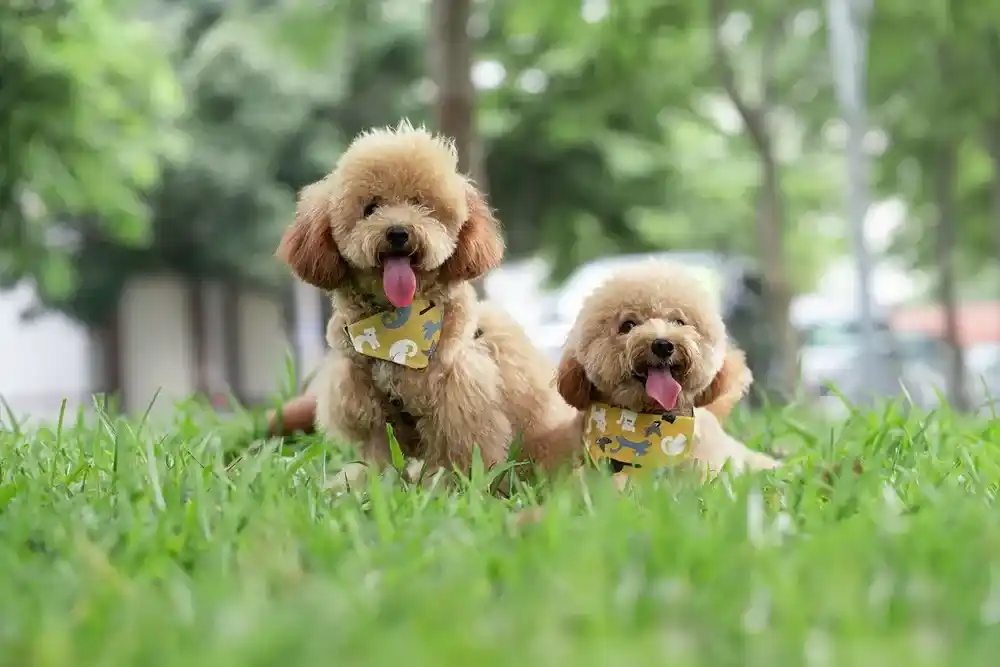
Toy Poodle Exercise Needs: Keeping Your Little Dog Active
Despite their small size, Toy Poodles have a lot of energy and require at least 60 minutes of exercise daily to stay happy and healthy. They enjoy physical and mental challenges alike.
Daily brisk walks provide great opportunities for your poodle toy to explore and stay fit. Interactive games such as fetch or tug-of-war stimulate their bodies and minds, helping prevent boredom and destructive behaviors.
Toy Poodles excel at agility training, enjoying obstacle courses where they jump, weave, and climb. Their natural intelligence makes them great candidates for scent work and puzzle toys, which sharpen problem-solving skills.
Water activities can be excellent low-impact exercises, especially beneficial for older dogs or those with joint issues.
Fuel your Toy Poodle’s energy with a balanced, high-protein diet that supports sustained stamina throughout their active day.
Training Your Puppy: Tips for Success
Toy Poodles rank among the most intelligent dog breeds, which makes training both enjoyable and effective. They learn quickly and respond well to positive reinforcement techniques.
Start training early and be consistent. Patience is key because their cleverness can also mean they pick up bad habits fast if training is inconsistent.
Potty training for puppies requires frequent breaks; expect roughly one hour of bladder control per month of age. Crate training offers a safe space for your pup and supports housebreaking.
Controlled socialization through puppy classes or meet-ups is essential to build confidence and good social skills.
Keep training sessions short but frequent to maintain interest. Use treats, praise, and play as rewards to motivate your Toy Poodle.
A nutritious diet supports cognitive development and steady moods, helping your pup focus during training.
Choosing a Reputable Toy Poodle Breeder
Once you’ve decided a Toy Poodle is the right companion, finding a reputable breeder is critical.
Reputable breeders prioritize the health and temperament of their dogs. They plan litters carefully, selecting parents free of genetic diseases and behavioral issues.
Ethical breeders often require applications and may have waitlists. They welcome visits to their facilities so you can meet their dogs and ask questions about health screenings, including hip dysplasia tests.
Avoid puppy mills, which often breed dogs in poor conditions and prioritize profit over health. Puppies from mills may suffer from long-term health and behavioral problems.
Breed clubs in your state and trusted online resources can help you find reputable breeders. Speaking with current dog parents also provides valuable insights.
Expect to pay between $1,800 and $5,500 for a Toy Poodle puppy from a good breeder. Remember that the cost of caring for your dog over its lifetime—including vet bills—is a significant commitment. Pet insurance can help manage unexpected expenses.
If you choose adoption, gather as much information as possible about the dog’s background. Providing love, patience, and routine will help your new Toy Poodle adjust smoothly.
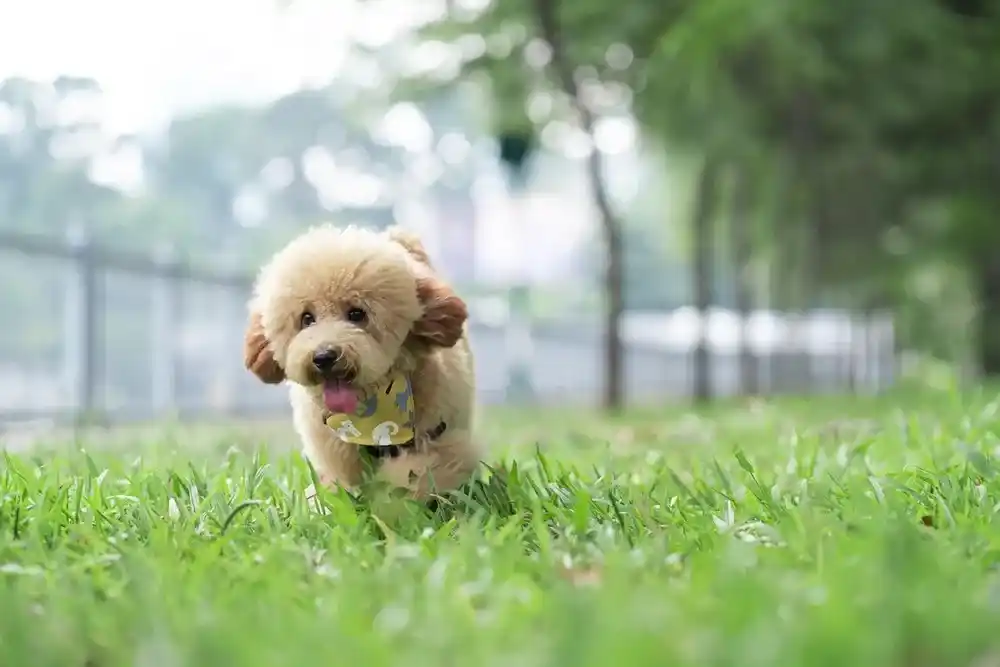
Toy Poodle Health Concerns and How to Manage Them
Toy Poodles generally enjoy good health, especially when sourced from responsible breeders. However, like all breeds, they can face specific health challenges.
One common issue is musculoskeletal problems. Toy Poodles may develop hip dysplasia or patellar luxation (dislocated kneecap). These conditions can cause pain and limit mobility. Puppies growing too fast due to excessive calcium or protein intake might be more vulnerable. Feeding a diet rich in joint-supporting nutrients—like omega-3 fatty acids found in sardines and fish oil—can help maintain healthy bones and joints.
Skin allergies also affect many Toy Poodles. Allergies may stem from food or environmental factors such as pollen. Identifying triggers is vital; elimination diets help detect food sensitivities. Maintaining a diet with anti-inflammatory ingredients like hemp seeds, safflower oil, and fish oil supports healthy skin and immune response.
Heart disease, including Mitral Valve Disease and Dilated Cardiomyopathy, affects some Toy Poodles. These conditions progress slowly but can lead to heart failure. Feeding a low-sodium diet and including heart-healthy foods like broccoli, mushrooms, and chia seeds supports cardiovascular health.
Regular veterinary check-ups ensure early detection of health issues, allowing prompt care and better outcomes.
Essential Grooming Tips for Your Toy Poodle
The Toy Poodle’s coat requires ongoing care. Their hair grows continuously, and three coat types exist: curly, wavy, and corded. Their low-shedding nature makes them ideal for allergy sufferers, but it also means regular grooming is a must.
Brushing with a slicker brush every few days prevents mats and tangles. Clipping every 4-6 weeks keeps their coat manageable and healthy. Many owners prefer styles like the classic continental clip or a shorter summer cut for practicality.
Bathing your Toy Poodle every 4-6 weeks using a gentle, dog-friendly shampoo keeps their coat clean without irritating their skin.
Don’t neglect nail trimming. Nails can grow quickly and cause discomfort or walking difficulties if ignored. Introduce trimming early with positive reinforcement to create a stress-free experience.
Dental care is equally important. Brush your Toy Poodle’s teeth several times a week to prevent plaque buildup and maintain healthy gums.
Ear hygiene prevents infections. Clean the outer ear with a damp cotton pad and use vet-recommended solutions as needed. Avoid inserting anything deep into the ear canal.
Regular eye cleaning and paw checks round out your Toy Poodle’s hygiene routine, keeping them comfortable and healthy.
FAQs
Are Toy Poodles hypoallergenic?
Yes. Their curly, dense coat sheds very little, releasing minimal dander. While no dog is 100% hypoallergenic, Toy Poodles rank among the best breeds for allergy sufferers.
When should I desex my Toy Poodle?
Your vet will advise the optimal timing based on your dog’s age, size, health, and behavior. Typically, desexing occurs when your dog reaches maturity.
How long is a Toy Poodle’s pregnancy?
Gestation lasts approximately 63 days, or nine weeks from conception.
Can Toy Poodles be left alone?
They prefer company and can develop separation anxiety if left alone too long. Training can help them tolerate moderate alone time.
Which Poodle type has the best temperament?
Standard Poodles tend to be calmer and more reserved. Miniature and Toy Poodles are more energetic and playful but equally intelligent and trainable.
What mixes well with Toy Poodles?
Popular hybrids combine Toy Poodles with other breeds to blend size, coat, and temperament traits, creating companionable and often hypoallergenic pets.
Conclusion: Why This Breed Could Be Your Perfect Companion
The Toy Poodle offers intelligence, loyalty, and a charming personality all wrapped up in a small, hypoallergenic package. They thrive in loving homes where mental stimulation and physical activity are priorities.
By providing a nutritious diet, regular exercise, ongoing training, and attentive grooming, you’ll ensure your Toy Poodle leads a long, happy, and healthy life. Whether you’re a first-time dog owner or an experienced pet parent, this breed’s adaptability and affectionate nature make it an excellent choice.
If you’re ready to welcome a Toy Poodle into your life, take the time to find a reputable breeder or consider adoption. Your efforts will reward you with a joyful companion for many years to come.

